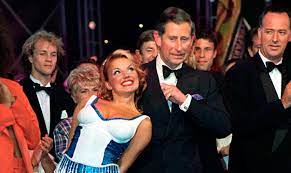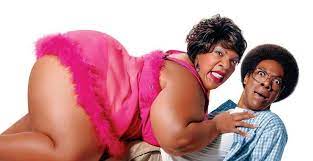"It took five women to have the voice of one man in the nineties" - Jayne Middlemiss
I remember the summer of 1996, primarily, for three things. (1) It was my first summer living in London and, being 27 years old, I took full advantage of that. (2) Euro '96:- Three Lions, Gazza's dentist chair celebration, thrashing the Netherlands 4-1, and, ultimately, losing (again) to Germany on penalties. (3) I started working at the Performing Rights Society. A company I would work for for twenty more years.
When I started the job I was worried I'd be in with some serious musos and that I'd really need to know my stuff musically (there were definitely some there but also some of the most ignorant about music people I have ever met in my life, I needn't have worried). Not just hip new sounds but oldies and even the current 'hit parade'.
Number one in the charts on the day I started at the society was a new band who'd caused quite a sensation. The Spice Girls Wannabe' had entered the charts at number three the week before and had climbed to number one, displacing Gary Barlow's dreary Forever Love and holding The Fugees' Killing Me Softly off the top spot.
It would stay there for a good few weeks, holding off challenges from Los Del Rio, Suede, Dodgy, and even big hitters like Michael Jackson, George Michael, and Robbie Williams. Even The Smurfs' I've Got A Little Puppy couldn't dislodge The Spice Girls. Eventually, Peter Andre's Flava knocked them off their perch but, that year, The Spice Girls had three of the best selling UK singles of the year.
I remember the time well - and it seems ridiculous that it is now over twenty-five years ago. I remember it being quite a (new) laddish time and one of the most popular conversation pieces was which of The Spice Girls you fancied the most. I think I triangulated between Geri, Victoria, and Emma. The no doubt devastated Mels didn't get a look in.
What's interesting about Channel 4's recent The Spice Girls:How Girl Power Changed Britain is looking back and realising how unelightened the times really were. Some of the stuff that was said, and done, by me as well as those in the public eye, is really quite cringe inducing now. We all thought we were so post-modern, hiding everything beneath a disappearingly thin veneer of irony, but, looking back at the time, we were, quite often, to put it simply, dicks.
As those close to the band tell the story of The Spice Girls and the times they operated in we also hear from the likes of Miranda Sawyer, Nadia Rose, Jayne Middlemiss, and Matthew Wright who were all, for better or worse, cultural figures of the time. This is padded out, rather well, with interviews with make up artists, Sun photographers, publicists, tour managers, Guardian journalists, and hair stylists and, between them all, they tell quite a remarkable story.
There are, of course, some utterly bizarre moments. Baby Spice stealing a homeless man's baseball cap outside St Pancras station, Nelson Mandela describing meeting the band as one of the greatest moments in his life, Geri kissing Prince Charles - probably not a big deal for a man who fantasises about being a tampon, and a clown being knocked over by a giant Milky Bar.
We get Elton John being Elton John (that sequinned stagecoach is never late), Simon Fuller and Simon Cowell drinking limoncello in Sophia Loren's house in Italy, and Mel B saying she hates Walkers crisps and prefers Wotsits.
We also get clips from Molly Dineen's depressing documentary about Geri's initial post-Spice Girls life and we get to see men (and other women) treating The Spice Girls viciously and inhumanely. Howard Stern conducts an interview with Emma, more than twenty years her junior, in which he creepily keeps going on about vibrators and we see Chris Evans, on TFI Friday, actually weighing Victoria live on air to see if she's anorexic.
Hardly the most scientific of methods. Add this to Trinny and Susannah's performative cruelty towards other women and Joan Rivers being a complete and utter cunt and you're left with the alarming realisation that Noel Clarke comes out of this era as a voice of reason.
Disturbing. There is surprisingly little inclusion of actual Spice Girls music and the Union Jack dress, you may remember that, doesn't get a single mention which leads me to suspect that the whole venture is somewhat unofficial. To be honest, it's probably all the better for that. Though The Spice Girls are presented fairly and without malice, this could never be mistaken for a puff piece.
The story starts in 1994 with auditions for the movie version of Tank Girl. In attendance are 19 year old Victoria Adams and 21 year old Geri Halliwell (she was nowhere near as old as people like Noel Gallagher and Mark Lamarr cruelly joked at the time, although the programme makers don't mention her age as they do Victoria's).
Though neither of them land a role, they do both land another audition. This time with Chris Herbert who is looking to put together, more or less, a female version of Take That. Though one that's a bit more credible, a bit more 'street' to use the parlance of the era.
There's not oo much time wasted on the getting the group together. Geri's in - blagging her place by sheer force of character, Victoria's in, Mel C's in, Mel B turns up and nonchalantly sings The Greatest Love of All and she's in. More interesting is how the auditions were scored. All the girls are marked between one and ten for various different things. They include dancing, singing, looks, and personality.
Victoria scores highest (7) on looks but lowest (5) on singing and personality and there's even, next to her name, a little remark - "NOT V.GOOD SKIN". 5/10 for the looks isn't so bad with these harsh judges. We see that many of the girls auditioned were given a mere 1/10 for how they looked.
Lianne Morgan, who shows up on the programme to tell her story - admirably free of bitterness, gets picked for the band and then, almost instantly, dropped. She's not quite right. She looks a bit too old. She's replaced by someone who doesn't have that problem. Emma Bunton. Baby Spice.
The Spice Girls are complete and soon it's all group hugs, vest tops, and teddy bears. A very innocent looking time. Songwriters and producers are called in but the five girls, already, seem very sure of themselves, very devoted, and very much eager to take as much control of their own career as possible.
Which wasn't particularly the plan for them. Geri, particularly, is ambitious and impatient with her ambition. She wanted a castle with a swimming pool that has an island in the middle and she started to wonder if they really needed Chris Herbert, if he'd be able to make true her dreams. So once she's persuaded the rest of the band they do a bunk and sign a deal with smug faced Simon Fuller.
Fuller's far better known and far more successful than Herbert and soon Virgin win the battle of the labels to sign The Spice Girls. They release Wannabe as their debut single and it goes to number one in thirty-seven different countries. It really does appear to happen that easily.
When their first album, Spice, comes out a couple of months later it becomes the biggest selling girl group long player in history and that year they turn on the Oxford Street Xmas lights while having the first of what would become three consecutive Christmas number one singles with 2 Become 1.
This all takes places against the backdrop of a laddish decade of supposedly ironic misogyny and sexism:- Loaded, FHM, Fantasty Football League, and TFI Friday. The Spice Girls have, thus far, hardly been taken as even a remotely political proposition so it's, in retrospect, a surprise when they take a slogan from the name of a fanzine by American riot grrrl band Bikini Kill and start shouting, somewhat vaguely and at every available opportunity, 'GIRL POWER'.
This stance, to me, at the time, sat at odds with The Spice Girls proudly announcing themselves as a brand. They launched Channel 5, they did a deal with Asda, they advertisted Pepsi, they advertisted crisps, and you could buy dolls of the band, kaleidoscopes, and all manner of tat. In 1997 they earned £50,000,000 and became a commodity but, in doing so, generated six times that figure in sponsorship.
This Thatcherite love of purchase power and wealth sat, for many, uneasily with the claims to being female role models but, in retrospect, there's no reason why that should have been the case. There's nothing wrong with using sex to sell a product when it's on your own terms. When The Spice Girls arrive, perhaps unwisely in hindsight dressed as school girls for a Polaroid shoot, Geri tells lecherous observes they "should know better" than to shout lewd comments and Mel B, quite simply, advises them to "fuck off".
Admirably, they refused to be shamed, not least by those lusting after them, and were sexy when they wanted to be, not when somebody told them to be. At least that's how it seems to me. Certainly by the standards of mainstream pop and the standards of the nineties.
By the end of 1997, now having had their first six singles and first two albums all go to number one, the stress of the workload was starting to show. Both on The Spice Girls and on Simon Fuller who they promptly dropped. Now that really was girl power.
At least if you ignore the rumour that he was having a relationship with Emma Bunton. Fuller seemed to think the end was nigh for The Spice Girls anyway and set about putting together S Club 7 with the aim of them taking over as the next big shiny pop thing.
The backlash, and the critics had been fierce anyway, certainly got stronger. Tabloids started pitting the band members against each other but the girls remained defiant that they were BFFs, Fans in Barcelona booed the band for 'prima donna antics', unlikely bedfellows like Matthew Wright and Shirley Manson from Garbage piled on, and they were even labelled the 'anti-christ'.
It got very personal and very unpleasant in a way which we'd, hopefully, call out now. It was suggested that Emma and Geri were getting too fat and on They Think It's All Over, a show that remains unlamented, Frank Skinner and the awful Rory McGrath suggested Mel C and Geri were both men. Geri, of course, got the worst of it.
To the degree that she felt the need to take a break from the band and then, after that, to leave the band completely. Fans cried and accused her of "letting the whole country down" (!) and though, in public and during performances on Parkinson's woeful chat show, she appeared confident it seems that in private she was lonely, vulnerable, and struggling.
Even hurt by the fact that not only were The Spice Girls continuing on without her but that they were thriving. With Geri gone, Victoria became the main focus. Helped by the fact that she was in a relationship with England's, possibly the world's, most famous footballer.
Posh'n'Becks became a tabloid obsession and Piers Morgan, a cunt if you've ever seen one, labelled Victoria the "new Queen"! She was held to such a high standard that when she had her first child, Brooklyn, in 1999 she was, by some, accused of encouraging teenage pregnancy.
Victoria Beckham was twenty-four years old and happily married. Around the same time Mel B, aged 23, gave birth to her first child and she, too, was accused of the same. In reality, what had happened was something perfectly normal for all friendship groups. They got into relationships, had children, and drifted apart.
That doesn't mean friendships have to end. They may lose some of their youthful intensity but they simply remould themselves to the circumstances, they adapt. In 1999 Geri kicked off her solo career and it started with four UK number one singles in a row. Though The Spice Girls were still, officially, together many of the others began releasing solo stuff too and Mel C did the best while, at the same time, feeding off impertinent questions about her sexuality from no less an authority than Richard Madeley.
Mel C played at the V festival in '99, along with Suede, Manic Street Preachers, Massive Attack, Orbital, and James Brown, which was assessed as quite a gamble as she wasn't deemed as cool as any of those acts. Most observers would agree that Mel C had the best voice of all The Spice Girls but listening back it seems to me that the most enjoyable solo effort was, surprisingly, Emma Bunton and Tin Tin Out's version of Edie Brickell's What I Am.
A record I had completely forgotten had ever existed. In the new millennium, The Spice Girls released their third album, Forever, and, astonishingly, it only reached number two. Held off the top spot by the chart monsters that were Westlife. The brickbats commenced again. Victoria, and even her infant son Brooklyn, both received death threats.
On that occasion, it seemed, it hurt them more than before. Partly because, by 2000, the feeling of being in a gang, that strength in numbers thing, seemed to have gone. The band unceremoniously called it day yet the Beckhams continued to become more and more famous. In 2003 when David moved from Man Utd to Real Madrid and took the family to Spain, Victoria became ever more the target and we witness one particularly unpleasant incident where the Evening Standard's stuck up former arts correspondent Brian Sewell calls her a "common little bitch" on television.
The 2000s seemed to be even worse for women in the public eye than the nineties. It's a decade of upskirting and the era of hounding women from Jade Goody to Amy Winehouse. The fact the last two both died almost incidental.
So when, in 2004, it was alleged that David Beckham had had an affair with Rebecca Loos guess who's fault it was? Well, obviously Victoria had not been able to 'satisfy' her errant husband. Mel B got so sick of the racist hate mail she'd received at her new home in Buckinghamshire that she upped sticks and moved to California where, and somehow I'd totally forgotten this ever happened, she started dating Eddie Murphy.
It didn't end well when the Beverly Hills Cop and Norbit star denied he was the father of their baby. A montage of the most powerful men of the era (Donald Trump, Harvey Weinstein, Max Clifford, and Simon Cowell) may lay it on a bit thick but compare the easy ride they were receiving at the time with the way women were getting treated.
Emma was given hassle for having kids, Mel C was given hassle for not having kids, and poor Geri seemed to be falling ever deeper into her loneliness and despair. It seemed it was pretty much all over for The Spice Girls but, as we know, that's not quite how the story ends. There was a coda, an encore, or two and, most likely, there will be a couple more.
In June 2007, introduced by Richard E Grant, all five Spice Girls are back on stage together for the first time since Geri's departure and, in 2012, there's another full band reunion - at the opening ceremony of the London Olympics. Although that, at least so far, appears to be the last time all five of them performed together.
Mel B's reality show, It's A Scary World, and her second place finish on Dancing With the Stars (beaten by the Brazilian racing car driver Helio Castroneves - no, me neither) are not enough for her to leave The Spice Girls but Victoria Beckham's 'brand' takes off in such a way that her time with The Spice Girls is over.
It seems likely she's just moved on and when they reform in 2018 it's without Victoria. As a story still ongoing fizzles out we hear of Mel B being hospitalised after being beaten by her new husband Stephen Belafonte (an allegation he denies) and we see Geri Halliwell marry the principal of the Red Bull F1 team Christian Horner. Emma and Mel C's stories are left hanging and the whole programme ends with a whimper rather than a bang which, all things considered, seems perfectly apt for The Spice Girls career. One that began with much more noise than it ended.
I don't know if The Spice Girls changed the world, or even Britain, but they were certainly around at the time the world was changing and not always for the better. They're definitely an interesting prism to view those changes through but I do think, in some way, they contributed to the debate and though most of their records, Wannabe perhaps an exception, were pretty forgettable, as a band, and as a sensation, they were anything but. Perhaps more than anything, with the benefit of hindsight, they were just a really nice bunch of people having a good time and, apologies for this term, living their best lives and enabling and empowering a generation of young girls to do the same. What's wrong with that, Brian Sewell?






















No comments:
Post a Comment